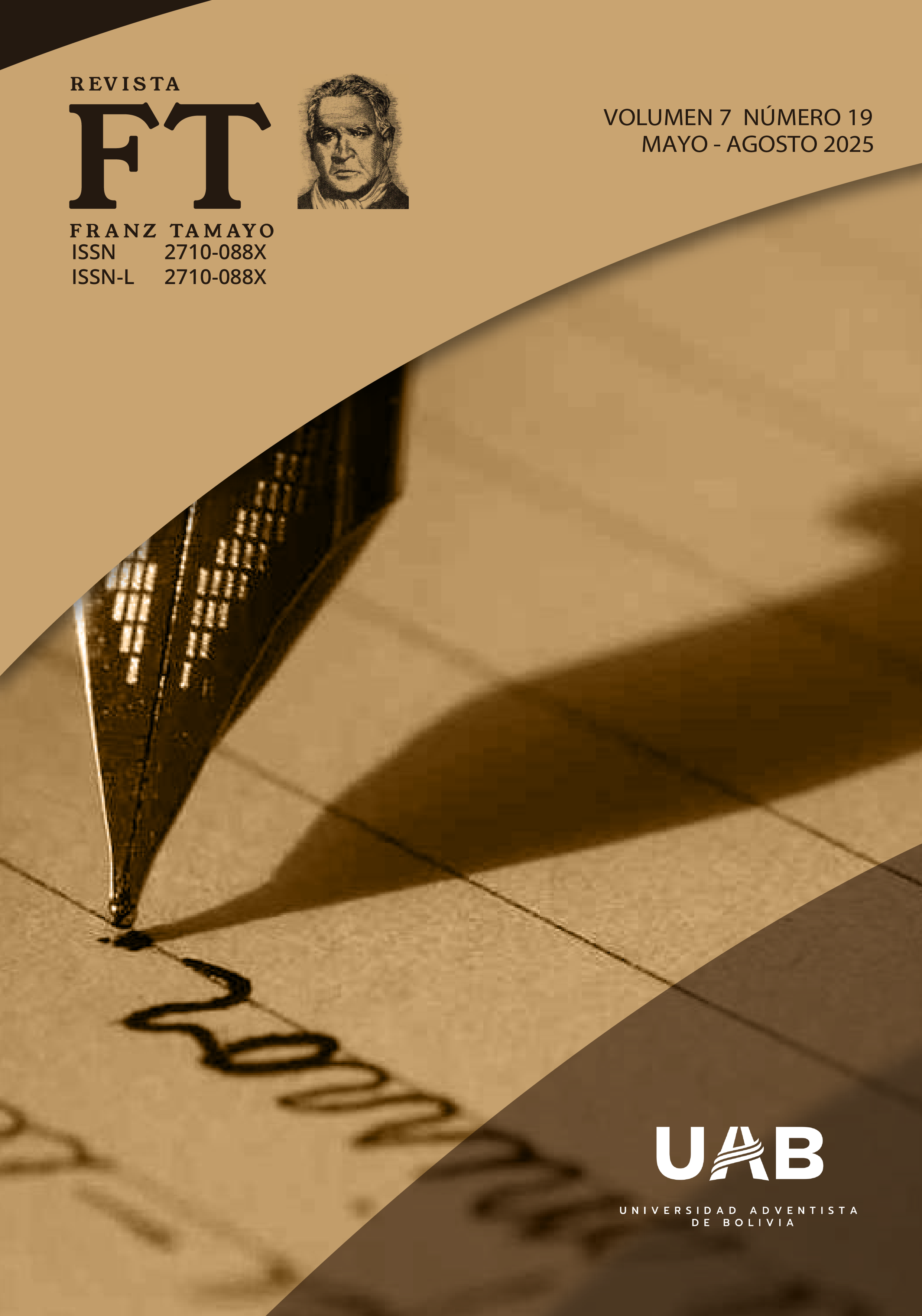Knowledge and perception of alcoholic beverage consumption among high school students in the municipality of Vinto: an analysis and strengthening strategies
Conocimiento y percepción sobre el consumo de bebidas alcohólicas en estudiantes de secundaria del municipio de Vinto: un análisis y estrategias de fortalecimientoMain Article Content
This study aimed to analyze and enhance knowledge and perception regarding alcohol consumption among secondary school students in the municipality of Vinto during the 2024 academic year. The research employed a qualitative approach with an experimental design, utilizing a psychoeducational intervention. The population consisted of 404 sixth-year secondary school students from public institutions. To assess knowledge about the effects of alcohol, the "Alcohol Knowledge Test for Adolescents (TAK)" was administered before and after the intervention. The intervention included two educational sessions, each lasting 45 minutes, focusing on the effects and risks of alcohol consumption. In the initial diagnostic phase, results indicated that 39% of students demonstrated a high level of knowledge about the effects of alcohol, 37% had a medium level, and 24% had a low level. After the intervention, 90% of the students achieved a high level of knowledge, representing a 51% increase, while the medium and low levels decreased to 8% and 2%, respectively. These findings highlight the effectiveness of the psychoeducational intervention in improving students’ knowledge about the risks associated with alcohol consumption, emphasizing the importance of preventive strategies in the school context.
El objetivo fue analizar y fortalecer el conocimiento y la percepción sobre el consumo de bebidas alcohólicas en estudiantes de educación secundaria del municipio de Vinto durante la gestión 2024. El estudio se desarrolló en coordinación con el Gobierno Autónomo Municipal de Vinto y la dirección Distrital de Educación del mismo municipio, tiene un enfoque cualitativo con diseño pre experimental, empleando una intervención psicoeducativa. La población estuvo conformada por 404 estudiantes de sexto de secundaria de instituciones fiscales. Para evaluar el conocimiento sobre los efectos del alcohol, se aplicó el "Test de Conocimiento sobre el Alcohol para Adolescentes (TAK)" en dos momentos: antes y después de la intervención. Los datos obtenidos fueron procesados mediante análisis estadístico utilizando el software SPSS. En la fase diagnóstica inicial, los resultados mostraron que el 39% de los estudiantes poseía un conocimiento alto sobre los efectos del alcohol, el 37% un nivel medio, y el 24% un nivel bajo. Tras la intervención, el 90% de los estudiantes alcanzó un nivel alto de conocimiento, lo que representó un incremento del 51%, mientras que los niveles medio y bajo disminuyeron al 8% y 2%, respectivamente. Se concluye que los hallazgos evidencian la efectividad de la intervención psicoeducativa para mejorar el conocimiento sobre los riesgos asociados al consumo de alcohol, resaltando la importancia de estrategias preventivas en el ámbito escolar.
Downloads
Article Details
Ahumada-Cortez, J. G., Gámez-Medina, M. E., & Valdez-Montero, C. (2017). El consumo de alcohol como problema de salud pública. Ra Ximhai, 13(2), 13-24.
Cabrera, N. (2017, 8 de mayo). Alcoholismo en adolescentes bolivianos aumenta. Opinión. https://www.opinion.com.bo/articulo/alcoholismo-adolescentes-bolivianos-aumenta/20170508070000634063.html
Centers for Disease Control and Prevention. (2020). Alcohol and public health: Frequently asked questions. https://www.cdc.gov/alcohol/faqs.htm
Gonzales, C. D. C. (2018). Factores de riesgo y protección del consumo de alcohol en adolescentes: Una revisión bibliográfica. Enseñanza e Investigación en Psicología, 23(3), 303-318.
Guerra Domínguez, E., Machado Solano, A. M., González Carrazana, Y. A., Mesa Batista, M., & Carrazana Fonseca, I. (2019). Risk perception of the harmful use of alcohol and its consequences in adolescents. Multimed, 23(4), 744–757. http://scielo.sld.cu/scielo.php?script=sci_arttext&pid=S1028-48182019000400744&lng=es&tlng=en
Lab Tecno Social. (2022). Consumo de alcohol en Cochabamba: Identidad y costumbres culturales. https://labtecnosocial.org/consumo-de-alcohol-en-cochabamba/
Lazo Herrera, L., Linares Cánovas, L., Vitón Castillo, A., & Díaz Pita, G. (2019). Nivel de conocimientos sobre alcoholismo en adolescentes de un consultorio médico. Revista 16 de Abril, 58(271), 15-19. https://rev16deabril.sld.cu/index.php/16_04/article/view/659
Miller, W. R., & Rollnick, S. (2018). Motivational interviewing: Helping people change (3rd ed.). The Guilford Press.
National Institute on Alcohol Abuse and Alcoholism. (2022). Underage drinking. https://www.niaaa.nih.gov/alcohol-health/support-treatment/underage-drinking
Organización Mundial de la Salud. (2018). Alcohol. https://www.who.int/es/news-room/fact-sheets/detail/alcohol
Patterson, S. I., Sandoval, F. J. E., Vargas, R. L., & Hernández Pérez, G. (2014). Nivel de conocimientos sobre alcoholismo en un grupo de adolescentes del Consultorio Médico de Familia No. 10 del Policlínico Universitario Norte del municipio Morón. Mediciego, 20(Suppl. 1).
Pons, D. S. V., Delgado, L. V. E., González, S. R., & Valdés Suárez, A. R. (2017). Nivel de conocimientos sobre alcoholismo en adolescentes de riesgo a través de una intervención educativa. Mul Med, 21(3), 218-232.
Rodríguez Calancha, C. M., Villalba Contreras, N. I., Machaca Vargas, N. K., & Ramos Ramos, A. J. (2023). Conocimiento de los efectos sociales sobre el consumo de alcohol en estudiantes de la Universidad Privada del Valle, La Paz Bolivia. Revista de Investigación e Información en Salud, 19(45), 13-22. https://doi.org/10.52428/20756208.v18i45.923
Roig Castro, I., María Soler, Y., Pérez Rosabal, E., Pérez Rosabal, R., & Soler Sánchez, K. (2017). Programa educativo para favorecer conocimientos sobre alcoholismo en adolescentes. MULTIMED, 21(3), 162-173. https://revmultimed.sld.cu/index.php/mtm/article/view/533
Salvatierra, B. (2014, 2 de diciembre). Vinto naturaliza el alcoholismo. Opinión. https://www.opinion.com.bo/articulo/cochabamba/vinto-naturaliza-alcoholismo/20141202070000632523.html
Universidad de las Américas. (2017). Asociación entre orientación sexual y consumo de alcohol en estudiantes de secundaria de Estados Unidos durante el año 2017. https://dspace.udla.edu.ec/handle/33000/13818
Valderá de Miranda, D., Betancourt Valladares, M., Silva Martínez, Y., & de Miranda Rodríguez, L. (2023). Educational intervention on alcoholism and its consequences for health in high school adolescents. Humanidades Médicas, 23(2). http://scielo.sld.cu/scielo.php?script=sci_arttext&pid=S1727-81202023000200001&lng=es&tlng=en

